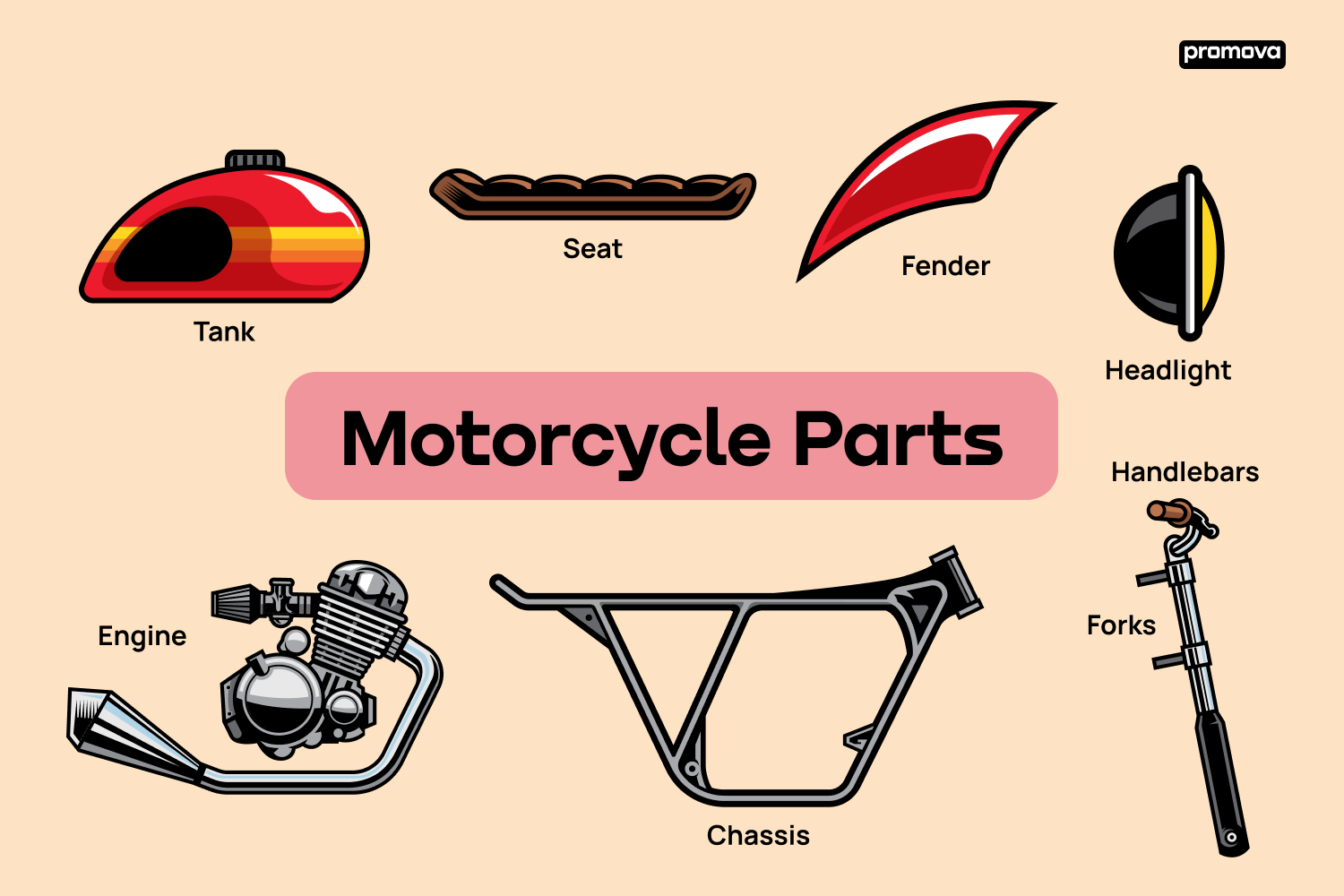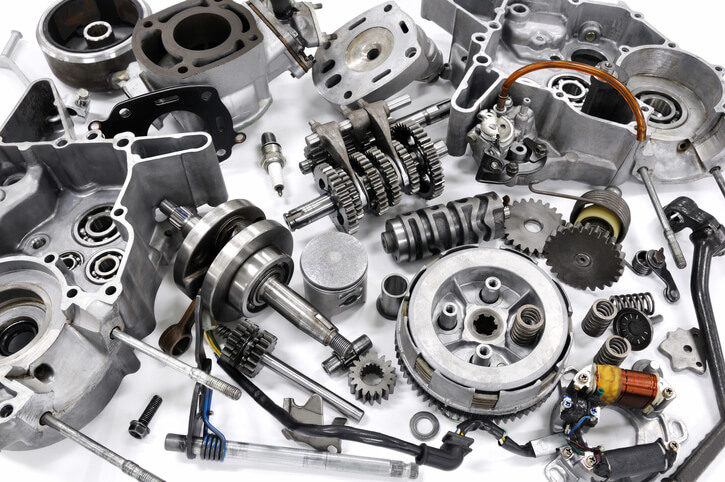Why Riders Trust Only Dealer-Certified OEM Parts New Zealand for Long-Term Value
Why Riders Trust Only Dealer-Certified OEM Parts New Zealand for Long-Term Value
Blog Article
Discover the Necessary Motorcycle Parts You Need for Optimal Performance
Recognizing the vital parts of a bike is essential for accomplishing peak performance. Each element, from the engine to the braking system, plays an essential duty in total performance and safety and security. Regular upkeep can prevent unexpected failings and improve the riding experience. Several motorcyclists ignore the complexities of these systems. Discovering how they interact can lead to a much more reliable adventure. What vital elements should every rider focus on?
The Engine: The Heart of Your Bike
The engine works as the core element of a bike, driving its efficiency and defining its abilities. It is accountable for transforming gas right into mechanical power, which powers the bike forward. Various sorts of engines are employed, consisting of single-cylinder, V-twin, and inline configurations, each offering unique attributes matched for various riding functions and styles. The engine dimension, usually determined in cubic centimeters (cc), considerably influences efficiency, with larger engines generally supplying more power and torque.Furthermore, the engine's style and technology, such as gas injection systems or air-cooling versus liquid-cooling, influence effectiveness and dependability. Upkeep is important for peak procedure; aspects like regular oil changes and checking ignition system assurance durability. Cyclists commonly take into consideration an engine's responsiveness and smoothness, as these features boost the total riding experience. Inevitably, the engine continues to be a critical element that specifies not only the motorbike's performance yet also the cyclist's link to the machine.
The Transmission: Moving Gears Smoothly
The transmission plays an important function in a motorbike's efficiency, specifically in the technicians of equipment changing. Comprehending exactly how to change gears efficiently can enhance the total riding experience, while normal maintenance guarantees peak performance. Appropriate focus to these facets can considerably influence the long life and effectiveness of the bike.

Gear Shifting Mechanics
Smooth gear changing is essential for excellent motorcycle performance, greatly impacting both velocity and control. The technicians of gear shifting entail the interaction in between the clutch, equipment lever, and transmission system. When a rider involves the clutch, it disengages the engine from the transmission, enabling a gear modification without harming the elements. A well-timed launch of the clutch, integrated with specific movement of the gear lever, helps with a seamless change in between gears. This process ensures that the engine operates within its best power band, enhancing efficiency. Motorcycle Parts Auckland. In addition, recognizing the gear ratios and their effect on speed and torque can help riders make notified selections throughout shifts, inevitably contributing to a much more receptive and satisfying riding experience
Maintenance Tips Significance
Routine maintenance plays a necessary role in ensuring that the transmission system operates effectively, permitting for smooth gear changes. Regularly inspecting and changing the transmission liquid is essential, as old fluid can cause increased friction and wear. Additionally, evaluating the clutch for wear warranties peak involvement and disengagement, preventing slippage throughout gear changes. Lubrication of relocating components is equally vital to minimize rubbing and enhance performance. Motorcycle owners should also monitor for leaks and unusual sounds, as these can show underlying issues. By adhering to these upkeep tips, bikers can extend the lifespan of their transmission system, guaranteeing that gear shifts remain smooth and adding to the general efficiency of their motorcycle.
The Braking System: Ensuring Safety And Security on Every Ride
Braking systems are basic elements that directly affect a motorbike's safety and performance. They are composed of different parts, consisting of brake pads, blades, calipers, and hydraulic lines, all collaborating to guarantee effective deceleration. The kind of braking system-- generally either disc or drum-- affects responsiveness and quiting power.Regular maintenance is necessary to maintain peak performance; worn brake pads can cause reduced performance and raised quiting ranges. In addition, the top quality of brake liquid must be kept track of, as it can take in wetness in time, jeopardizing stopping efficiency.Riders need to likewise take into consideration the value of anti-lock stopping systems (ABDOMINAL MUSCLE), which protect against wheel lockup during abrupt stops, boosting overall safety and security. Correctly functioning brakes are not simply about stopping; they impart self-confidence in the cyclist, permitting much safer navigating via numerous terrains. Inevitably, a reliable braking system is vital for taking pleasure in every adventure with assurance.
The Suspension: Enhancing Comfort and Control
A well-functioning shock absorber greatly adds to a motorcycle's total efficiency, complementing the effectiveness of the braking system. The suspension plays a considerable role in soaking up shocks from irregular surfaces, assuring a smoother trip while keeping tire contact with the roadway. This call is crucial for both stability and control, enabling cyclists to browse corners with self-confidence and precision.Different types of suspension systems, such as telescopic forks or mono-shocks, supply varying levels of convenience and handling. Effectively tuned suspension improves responsiveness, providing the cyclist with a much more connected feeling to the motorcycle. Normal maintenance checks are necessary to establish the suspension parts, consisting of springs and dampers, are working at their best. A reliable shock absorber not only elevates the riding experience however additionally adds to the longevity of other motorcycle components by lessening deterioration. Therefore, purchasing high quality suspension is important for any type of major motorcycle fanatic.
The Tires: Connecting You to the Road
Tires play an essential function in a motorcycle's efficiency, serving as the key link between the motorcyclist and the roadway. Understanding the various kinds of tires offered can greatly affect handling and security. Furthermore, regular upkeep is important to guarantee peak tire performance and durability.
Tire Keys In Explained
Just how do different tire kinds influence a motorcycle's performance? Tire types play an essential role in establishing a motorcycle's stability, handling, and grip. Sport tires, created for high efficiency, offer boosted grip and responsiveness on paved roads, making them ideal for competing and aggressive riding. Conversely, touring tires prioritize longevity and convenience, providing a smoother ride for long-distance traveling. Off-road tires, characterized by their tough step patterns, master grip on unpaved surfaces, ideal for adventure fanatics. Furthermore, dual-sport tires blend features from both off-road and on-road groups, providing to versatile riding demands. Eventually, selecting the appropriate tire type is vital for maximizing efficiency, ensuring safety, and boosting the general riding experience.
Upkeep Tips Offered
While riding when traveling, maintaining optimal tire condition is crucial for security and performance. Frequently examining tire pressure is very important, as under-inflated tires can lead to poor handling and boosted wear. It is suggested to check tread depth frequently; worn tires compromise grip and stability. Furthermore, his explanation motorcyclists ought to search for indications of damages, such as cracks or bulges, which can show the demand for replacement. Revolving tires regularly guarantees even use, boosting durability. Additionally, maintaining tires clean from debris and avoiding too much visuals can lengthen their lifespan. Ultimately, keeping correct alignment and balance adds to come to a head efficiency, minimizing stress on various other bike elements. Following these upkeep ideas will greatly enhance the general riding experience.
The Gas System: Fueling Efficiency and Performance
The gas system plays an important function in maximizing a motorbike's efficiency and effectiveness, as it assures the optimal shipment of fuel to the engine. It consists of several crucial elements, including the gas container, fuel pump, gas filter, and gas injectors or carburetor. Each component has to great site work successfully to ensure a powerful and smooth ride.The fuel tank stores gasoline and supplies it to the engine using the fuel pump, which creates the needed pressure. A gas filter avoids impurities from going into the engine, while the injectors or carburetor mix gas with air for combustion.Proper maintenance of the fuel system is important; a clogged filter or malfunctioning injector can bring about lowered efficiency and boosted gas usage. By confirming that the gas system runs effectively, bikers can enjoy enhanced throttle reaction, better gas economy, and in general improved riding experience.
The Electrical System: Powering Your Experience
A reliable electric system is crucial for the overall functionality and safety of a motorbike, as it powers vital parts such as the ignition, lights, and numerous electronic systems. This system includes the battery, which stores energy, and the generator, in charge of generating power while the engine runs. The electrical wiring harness attaches these parts, making certain reputable power distribution.Additionally, integrates safeguard the system from overloads, while relays assist control high-current devices with low-power signals. A properly maintained electrical system boosts efficiency by making sure smooth starts and consistent operation of lights and signals, crucial for motorcyclist exposure and safety.Regular checks of the battery's cost and connections are necessary for avoiding electrical failures. Cyclists ought to also check circuitry for deterioration, making sure all components operate preferably. Eventually, a robust electric system adds considerably to the total performance and reliability of the motorbike.
Regularly Asked Inquiries
Just how Often Should I Replace My Motorbike's Battery?
The regularity of motorbike battery replacement depends on use and upkeep (Bike Parts Wellington). Usually, batteries must be replaced every three to five years. Routine checks can help determine when a replacement is needed for peak efficiency
What Devices Do I Required for Standard Bike Maintenance?
For basic bike upkeep, one calls for vital tools such as a socket collection, wrenches, screwdrivers, pliers, tire pressure gauge, and a torque wrench. These devices promote effective upkeep and guarantee the motorbike runs efficiently and securely.
Exactly How Can I Enhance My Bike's The rules of aerodynamics?
To boost motorbike aerodynamics, one ought to take into consideration readjusting fairings, making use of windscreen extensions, enhancing body placement, our website and reducing general weight. These adjustments assist lessen drag, enhancing stability and gas efficiency throughout trips.
What Are the Signs of a Failing Electrical System?
Indicators of a failing electrical system consist of lowering lights, difficulty beginning, irregular instrument readings, and blown fuses. Oem Parts New Zealand. Unusual smells or corrosion around battery terminals may likewise indicate underlying problems requiring prompt attention for safety and performance

Exactly how Do I Choose the Right Oil for My Motorcycle?
When picking oil for a motorbike, one should think about the maker's requirements, thickness scores, and the type of riding. Additionally, conventional versus artificial oil can affect efficiency and engine defense, affecting the decision significantly. The engine size, typically gauged in cubic centimeters (cc), considerably influences efficiency, with larger engines generally supplying even more power and torque.Furthermore, the engine's layout and innovation, such as fuel injection systems or air-cooling versus liquid-cooling, affect performance and integrity. A well-functioning suspension system greatly contributes to a motorcycle's general efficiency, complementing the performance of the stopping system. The gas system plays an important function in making best use of a motorbike's performance and effectiveness, as it assures the optimal distribution of gas to the engine. A gas filter avoids contaminants from entering the engine, while the injectors or carburetor mix fuel with air for combustion.Proper maintenance of the gas system is essential; a clogged up filter or malfunctioning injector can lead to lowered performance and increased gas consumption. A properly maintained electrical system improves performance by guaranteeing smooth starts and consistent procedure of lights and signals, crucial for rider presence and safety.Regular checks of the battery's fee and links are important for avoiding electric failings.
Report this page